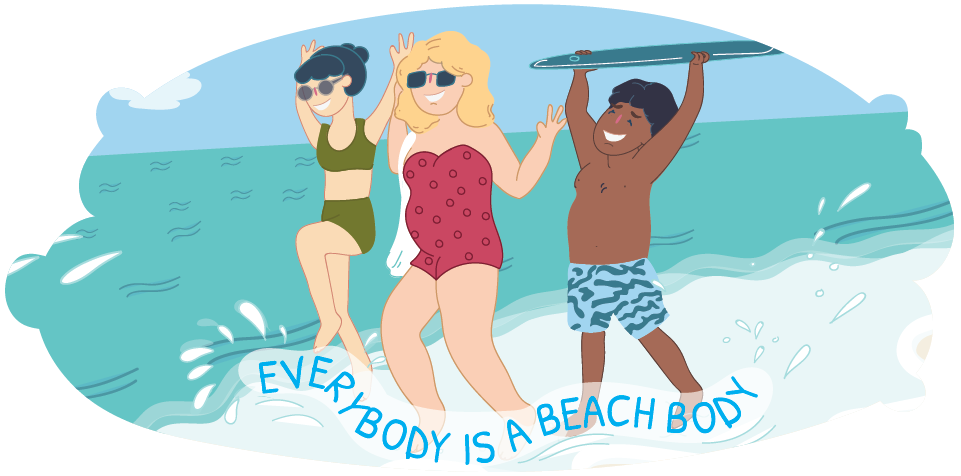Types of eating disorders explained
Eating disorders are complex and can come in many forms. Here are the most common types and their warning signs.

Common types of eating disorders
There are four common types of eating disorders that are recognised by the Diagnostic and Statistical Manual of Mental Disorders (DSM), which are:
- Binge eating disorder
- Bulimia nervosa
- Anorexia nervosa
- Other specified feeding and eating disorders (OSFED)
Binge Eating Disorder
People with binge eating disorder feel unable to stop themselves from eating and can eat a very large amount of food in a short space of time, even when they feel full.
Here are some signs that someone might have binge eating disorder:
Feeling a lack of control around food or eating
Eating large amounts of food regularly, even when they’re not hungry
Feelings of embarrassment, guilt or disgust about overeating
Sensitivity to comments around food, weight or appearance
Feeling extremely upset or anxious after overeating
Eating to the point of feeling uncomfortably full
Being secretive about what they eat and when
Eating alone, in secret or avoiding social events around food
Shoplifting food or spending large amounts of money on food
Hoarding or hiding food and food wrappers around the house
Feelings of embarrassment, guilt or disgust about overeating
Experiencing anxiety, depression, irritability or low self-esteem
Avoiding questions about eating and weight
Continuing to eat even though they feel full
Bulimia Nervosa
Like binge eating disorder, people with bulimia nervosa eat a large amount of food in a short period (bingeing) but then take action to get rid of this food (purging), such as vomiting, over-exercising or not eating for a long period.
Here are some signs that someone might have bulimia nervosa:
- Fearful of gaining weight
- Putting on or losing weight really quickly
- Having a distorted body image or low self-esteem
- Feeling depressed, anxious or guilty - especially at meal times
- Preoccupation with eating, food, body shape and weight
- Fasting, counting calories or avoiding food groups
- Excessive or compulsive exercise, even when sick or injured
- Vomiting, misusing laxatives or appetite suppressants
- Going to the bathroom during or shortly after meals
- Disappearance of food or buying lots of food and hiding it
- Using drugs (legal or illegal) inappropriately to control weight
- Eating in private and avoiding meals with others
- Sensitive to comments about food, weight, body shape or exercise
- Physical signs like tooth decay, feeling tired, dizziness
Anorexia Nervosa
People with anorexia have intense fear of gaining weight and reduce the amount of food they eat, which leads them to being significantly underweight. Some may also binge, purge or exercise excessively.
Here are some signs that someone might have anorexia nervosa:
Limiting food intake, avoiding or skipping meals
Problems with body image or denial of being underweight
Preoccupied with food, body shape, weight or appearance
Counting calories, constant dieting or avoiding food groups
Low self-esteem (guilt, self-criticism, worthlessness)
Rigid thinking (‘black and white’, eg. there are ‘good and bad’ foods)
Saying they’ve eaten when they haven’t or hiding uneaten food
Sensitive to comments about body shape, weight or eating
Vomiting, misusing laxatives or appetite suppressants
Changes in their clothing style or appearance
Avoiding situations involving food or spending more time alone
Rituals around food (cutting into small pieces, eating slowly)
Repetitive body-checking (weighing, looking in the mirror)
Excessive or compulsive exercise, even if injured or sick
Rapid weight loss
Heightened anxiety around meal times
Feeling faint, dizzy, tired or cold all the time
Intense fear of gaining weight
Other Specified Feeding or Eating Disorder (OSFED)
People with OSFED have many of the symptoms of the other eating disorders, but don’t meet all the symptoms needed for a diagnosis of anorexia nervosa, bulimia nervosa or binge eating disorder.
Here are some signs that someone might have OSFED:
- Weight loss or weight gain
- Preoccupation with food, eating, weight or body shape
- Distorted body image and low self-esteem
- Feelings of shame or guilt, especially after eating
- Sensitive to comments around food, weight or body shape
- Skipping meals, counting calories or avoiding certain food groups
- Binge eating or eating at unusual times
- Going to the bathroom during or shortly after meals
- Excessive or compulsive exercise, even if injured or sick
- Repetitive body-checking (weighing, looking in the mirror)
- Saying they’ve eaten when they haven’t or hiding uneaten food
- Avoiding situations involving food, or spending more time alone
- Physical signs like feeling faint or dizzy
Eating disorders can have a devastating impact on someone’s health. It’s important to seek support as soon as you notice any warning signs.
Who can help
If you think that you or someone you know is showing signs of an eating disorder, it’s important to seek help as soon as possible.
Here’s who can help:
You don’t have to go through this alone.
We’re here to help.
Give us a call, start a WebChat or email us today.
If you are looking for more digital services and resources, check out Head to Health.
Check these out too:
Eating disorders
Eating disorders are serious and can affect anyone. They can take many ...
READ MEDeveloping a positive body image
If you sometimes judge yourself and feel uncomfortable in your own body, ...
READ MELooking after yourself
If you’re juggling lots of things like work, study and relationships, ...
READ MEHow to ask for help
Sometimes we need help but we're not able to ask for it. ...
READ METalking helps! We’re here for you.
No problem is too big or too small.
We're here 24 hours a day, 7 days a week






